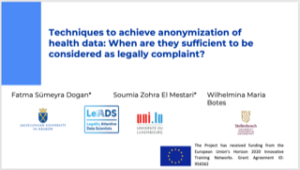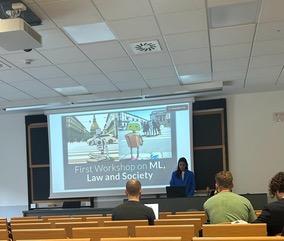ESRs Fatma S. Doğan and Soumia El Mestari at Conference on Machine Learning and Principles and Practice of Knowledge Discovery in Databases
European Conference on Machine Learning and Principles and Practice of Knowledge Discovery in Databases held in Turin, Italy between the 18th to the 22nd of September 2023. The conference took 5 days of insightful presentations given by researchers on machine learning and data mining. On the last day of the conference, the First Interdisciplinary Workshop on ML, Law and Society took place which aims to bring together researchers and practitioners from computer science, law, and psychology to discuss the non-functional tradeoffs, ethics, and law related to ML. The workshop started with a keynote speech given by Prof. Giovanni Comande. In his talk, Prof. Comande mentioned the ethical aspects of integrating AI and machine learning systems into our lives. He drew attention to crucial points in order to have a meaningful and lawful contribution of AI, we must also create common ethical ground rules.
 In the workshop, ESRs Fatma S. Doğan and Soumia El Mestari presented their paper titled: “Techniques to achieve anonymization of health data: When are they sufficient to be considered as legally compliant?” in which they have worked together with Dr Wilhelmina Maria Botes. In the study, they discussed the European Health Data Space(EHDS) and how it relates to using health data while aiming to keep it anonymized for secondary use purposes. They analyzed that the current stage of the EHDS proposal omits important points in terms of the operation of the secondary use framework. Further, they explored that achieving anonymization of various types of health data poses different challenging points in terms of technicality.
In the workshop, ESRs Fatma S. Doğan and Soumia El Mestari presented their paper titled: “Techniques to achieve anonymization of health data: When are they sufficient to be considered as legally compliant?” in which they have worked together with Dr Wilhelmina Maria Botes. In the study, they discussed the European Health Data Space(EHDS) and how it relates to using health data while aiming to keep it anonymized for secondary use purposes. They analyzed that the current stage of the EHDS proposal omits important points in terms of the operation of the secondary use framework. Further, they explored that achieving anonymization of various types of health data poses different challenging points in terms of technicality.
ESRs received thoughtful questions and feedback from the participants and also attended enriching panels and keynotes at the conference. The keynote given by Kate Crawford was also enlightening in regard to not-so-known facts about AI technologies. She remarks that environmental effects, mining rare earth minerals, and immense human labor which has been used in order to develop AI technologies are often omitted. She resembles generative AI to magic since we don’t know the cost of building it as a result of big tech companies not being transparent. To improve this field, she suggests that we should re-think the training process along with fair working conditions. Also, more research on sustainable generative AI should take place, and openness in research should be increased since we are suffering from a lack of transparency. In a way, she shed light on shadowed parts of developing AI technologies and stated that if we know the true cost of AI technologies then we could be more conscious about what we want and what we don’t want, and our needs. Lastly, she mentioned her book named, Atlas of AI in which she explored deeply what she discussed.
She remarks that environmental effects, mining rare earth minerals, and immense human labor which has been used in order to develop AI technologies are often omitted. She resembles generative AI to magic since we don’t know the cost of building it as a result of big tech companies not being transparent. To improve this field, she suggests that we should re-think the training process along with fair working conditions. Also, more research on sustainable generative AI should take place, and openness in research should be increased since we are suffering from a lack of transparency. In a way, she shed light on shadowed parts of developing AI technologies and stated that if we know the true cost of AI technologies then we could be more conscious about what we want and what we don’t want, and our needs. Lastly, she mentioned her book named, Atlas of AI in which she explored deeply what she discussed.





